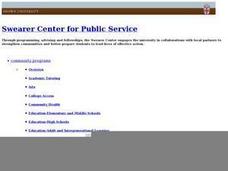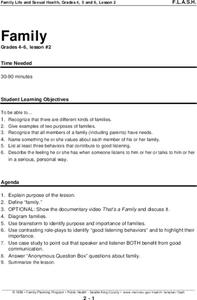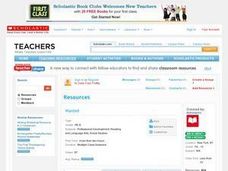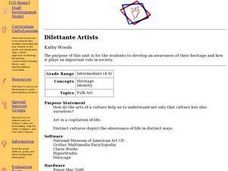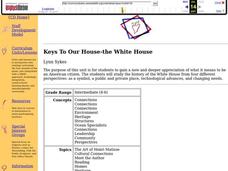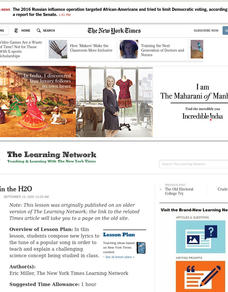Curated OER
No Fears
Twelfth graders imagine themselves living in a different world and attempt to see themselves in the world differently.
Curated OER
Family
Students investigate the purpose, needs, and behaviors of a variety of configurations of families. The benefits of good communication skills among family members are emphasized in this lesson.
Curated OER
Wanted!!
Fourth graders study insects in their habitats looking at survival characteristics and whether the insect is a predator or an herbivore. They investigate characteristics that improve the survival of a species and its ability to reproduce.
Curated OER
Design a School
Students create a design for their ideal school. They work in groups to design a part of the school and put the designs together to create one complete school design.
Curated OER
Democracy: Participating in the Process
Students research all of the candidates running in an upcoming election. They interview them if possible and state their platforms. They organize a forum for the candidates to come and speak at their school.
Curated OER
Texas
Seventh graders are introduced to the characteristics of the state of Texas. In groups, they research one of the twelve regions of Texas and write a letter to each major town in the region to gather more information. Once information...
Curated OER
Dilettante Artists
Students investigate their personal heritage. They research and record iand organize nformation in journal notes. Students create folk art using a variety of techniques and media.
Curated OER
Keys To Our House-the White House
Learners explore the history of the White House from four different perspectives: as a symbol, a public and private place, technological advances, and changing needs. They take a virtual tour of the White House and explore its history....
Curated OER
Keys to Our House-The White House
Students explore what it means to be an American citizen. Students investigate the history of the White House from a variety of perspectives: as a symbol, a public and private place, and changing needs.
Curated OER
Life During the Industrial Revolution
Seventh graders present information about the Industrial Revolution. In this Industrial Revolution lesson plan, 7th graders work in groups research inventions and prepare an information poster for the invention. Students present their...
Curated OER
"First Day of School - Make a Puzzle"
Third graders create a puzzle piece to be included in a class puzzle. They are given one puzzle piece, and they decorate it using symbols/drawings which are personal to them such as hobbies, interests, or self-portrait. The pieces are...
Curated OER
Singing in the H2O
Learners compose new lyrics to the tune of a popular song in order to teach and explain a challenging science concept being studied in class.
Curated OER
Introduction to the Project
Pupils are introduced to the Social Action Project. They research different organizations and develop a time line for their project. They also use the internet to search for causes that are important to them.
Curated OER
Let's Make Lemonade Lesson 1: What is a Philanthropist?
Learners define the words philanthropists and philanthropy. They make flip books representing the story, The Lion and the Mouse and retell the story to a classmate.
Curated OER
Making Choices With Scarce Resources
Students examine the role of scarcity and how to allocate resources. They describe examples of opportunity costs and tradeoffs. They choose a service project based on a cost and benefits analysis. They finally evaluate the impact of the...
Curated OER
Fun With Graphs
First graders read about making graphs and lean how to make graphs using "The Graph Club" software.
Curated OER
Insight Arts
Young scholars view a mural and identify, describe, and discuss what they see. They are introduced to and demonstrate the functions of key structural elements of poetry by writing a poem about themselves that highlights their interests...
Curated OER
Stop the Violence
Students examine and discuss various artworks by Keith Haring. They design and create a Keith Haring style painting that communicates a message about an important social issue.
Curated OER
Riparian: The Guardian of the Waterways
Students become educated on what a riparian is, the need for riparian, and how a riparian corridor (forest, habitat) can protect waterways. Students construct dioramas depicting riparian habitats.
Curated OER
Do a Ditty
Fourth graders work in cooperative groups to create a ditty to teach the characteristics that distinguish literary forms to younger students. The ditty is performed before the class.
Curated OER
Color My World
Fourth graders write poems using color to describe their feelings and environment. After viewing a sample student poem imbedded in this plan, 4th graders utilize The Student Writing Center educational software program to type their poem.
Curated OER
The Very Hungry Kindergartner
Students create The Very Hungry Kindergartner books. In the books, students will write in and illustrate a page for each month they are in school.
Curated OER
Inter-City Jazz Songbook Project
Students choose a city with famous musical highlights and create a tourist brochure.
Curated OER
Essential Services
Students discuss necessary community services then complete a worksheet by filling in essential services, the needed inputs and outputs produced by fulfilling the service.


